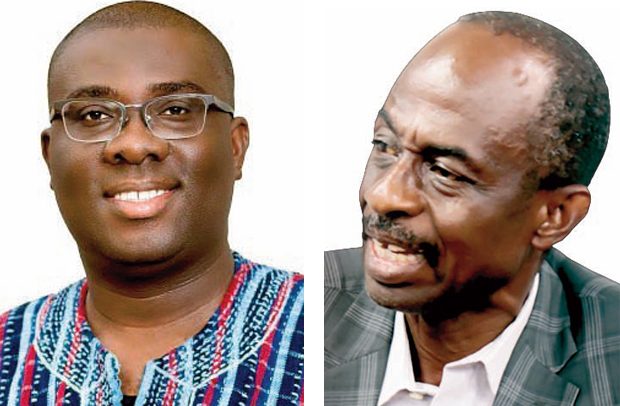Sammy Awuku, Johnson Asiedu Nketia
The National Organizer for the New Patriotic Party (NPP), Sammi Awuku, says it is hypocritical of the opposition National Democratic Congress (NDC) to demand the inclusion of the Justice Emile Short Commission’s findings in the ongoing anti-vigilantism roadmap.
According to him, the NDC boycotted the commission when it was set up to investigate the Ayawaso West Wuogon by-election violence on January 31, but now wants the findings to be incorporated in the anti-vigilantism roadmap.
Speaking on Accra-based Citi FM on Tuesday, the NPP National Organizer said the NDC is hypocritical on the issue and accused them of impeding the work of the committee working on the roadmap.
“They did raise the matter but we find it very hypocritical because this was the political party that openly and officially said they were boycotting the Emile Short Commission. The NDC said they didn’t want to have anything to do with the Emile Short Commission,” he said, adding “they subsequently issued a statement asking their members not to cooperate with the Emile Short Commission but today the NDC wants to use the report as a prerequisite before moving forward.”
The NDC appears skeptical about the success of the dialogue between the NPP and the National Peace Council together with other stakeholders trying to find ways to end political vigilantism in the country.
This follows the postponement of the adoption of a roadmap drawn by the Peace Council to help end the practice.
The leading opposition party has been pushing for President Akufo-Addo to release the Emile Short report but the President is adamant and has said that nobody can stampede him into doing what is against the Constitution.
Asiedu Nketia
Addressing the press after the fourth session of the dialogue series at Peduase, the General Secretary of the NDC, Johnson Asiedu Nketia, claimed excerpts of the roadmap vindicated their position on the dialogue.
“This is a big problem which needs the engagement of all stakeholders who have a role to play in eliminating vigilantism,” he said, adding “two political parties alone cannot eliminate vigilantism.”
“It needs everybody on board. So if we are able to determine if it is the work of the police which hasn’t gone down well that is why the canker is not being addressed, then the police leadership needs to commit to doing their work better,” he said.
He added, “That is how you draw a roadmap for implementation. How can we be sitting down here and be drawing roadmaps for issues that we don’t have control over.”
Long Road
Last month, the National Peace Council said the two main political parties have agreed to allow the council to develop a roadmap to help stop the activities of political vigilante groups in the country and said both sides were supposed to make input into the roadmap.
Vigilantism Bill
President Akufo-Addo had made it clear that with or without the political parties building consensus on the issue of vigilantism, he was determined to push for a law to stem the tide.
The Attorney General upon the instruction from the President then laid Vigilantism Bill in Parliament for consideration.
However, on April 29, Parliament indefinitely suspended the consideration of the Vigilantism and Related Offences Bill, 2019, introduced to the House on April 11 by the AG under a certificate of urgency.
After the introduction of the bill, the Speaker of Parliament, Prof. Mike Oquaye, asked the Committee on Constitutional, Legal and Parliamentary Affairs to scrutinize the bill for further fine-tuning before the consideration and consultations and input from the public to make the bill stand the test of time.
Majority Leader, Osei Kyei-Mensah-Bonsu later announced that the Committee on Constitutional, Legal and Parliamentary Affairs had made a request for more time for more stakeholders’ consultations because of the importance of the bill – a call backed by the Minority side in Parliament.
Key Issues
Since President Akufo-Addo asked the two parties to dialogue over political party vigilantism, the opposition NDC has been insisting that the issue requires a national multi-stakeholder engagement to deal with it.
In response to the NPP’s invitation, the NDC, in a letter signed by its Chairman, Samuel Ofosu-Ampofo, said they agree that the parties should meet but want the scope to be broadened.
The NDC acknowledged the wisdom in President Akufo-Addo’s drive to pass a legislation to deal with the menace, but maintained that a national consensus on the matter would be necessary.
By A.R. Gomda


